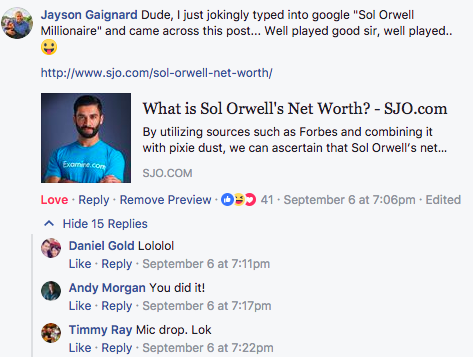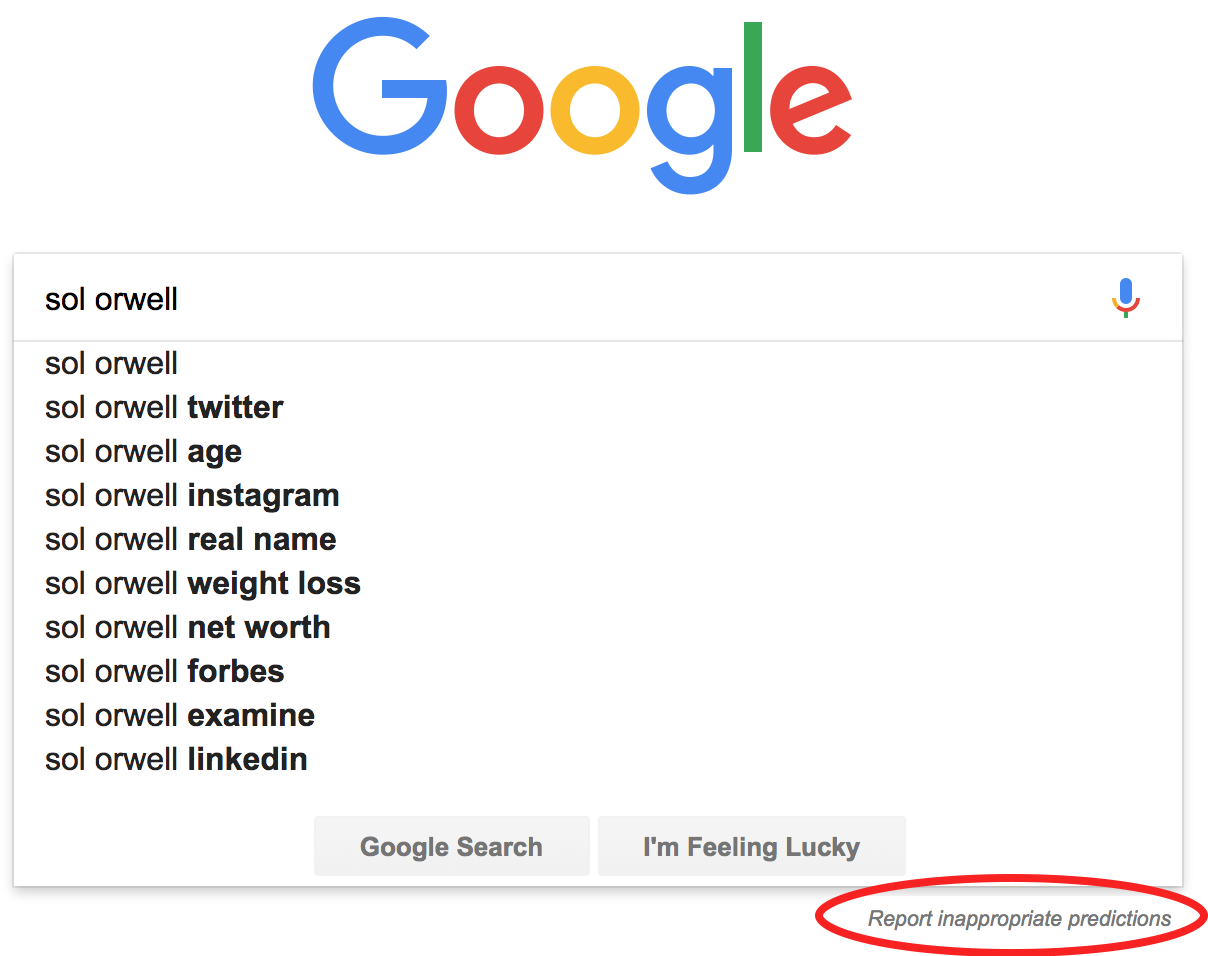My last article, Reputation Management 101, covered the basic stuff. This article covers a bit of the more advanced stuff (and your chance to have fun with it).
Do you know what people are looking up about you?
I’ve always found it fascinating to see what Google’s autosuggest starts throwing out after you type in my name (after all, it’s driven but what people are looking for).
I notice autosuggest kicking in when I first started to emerge from my cocoon (a story I will cover as part of my networking series).
After my article on Forbes (and Tim Ferriss subsequently sharing it), ‘sol orwell net worth’ went right to the top.
(Most people with even a small-sized audience seem to have ‘net worth’ as the top search suffix – evidently people are really curious about how much other people are worth!)
As an inside joke with those following me, I’ve even posted about this multiple times on Facebook:
Still, it’s something to keep your eye on. It would not look good for me to have ‘sol orwell scam’ as an autosuggest by Google (though it would raise the question – what the hell am I scamming you on – I don’t offer anything to sell!)
To level up your reputation management, it’s important to keep an eye on what people are searching for on your brand.
Are you enjoying yourself?
Part of the why behind SJO.com is to have fun. I can experiment without having to worry about any impact on the bottom line of my businesses.
I always thought it was a bit hilarious (and I guess too-bad) that people were looking for information on me and were unable to find it.
Thus, en route to Japan 5 months ago, I created pages on what people were looking for. I mean, that’s just what a friendly person does right?
Sol Orwell net worth? I gotchu.
Sol Orwell real name? I mean, I am Sol!
Sol Orwell age? I’m an old soul, but I can help you out.
And a bit of ridiculousness too: Sol Orwell being one of the most handsomest guys you will find in the Torontos.
I created six different pages. And 6 weeks ago I added two more (based on the new phrases people were searching for).
The pages were written in my typical style – irreverent and tongue-in-cheek.
People are searching for things about you. May as well make pages on it and control that message.
Results on this experiment
I seeded the pages by adding them to my about page and asking a few friends who had interviewed me to link to a few of them.
I planned to see:
- How many people actually visited the pages
- How many people actually opted into the SJO Fam
- Could I get onebox answers going?
Unfortunately, a slight wrinkle was thrown in my plans.
About a month ago, I posted on Facebook how I refuse to associate with brands that have the word ‘millionaire’ in it. It yells “I’m chasing money but don’t know what i’m doing.”
In the comments section, my buddy Jayson blew the lid on my little fun-project:

A pertinent point: Jayson’s comment was surrounded by many other comments. It garnered “only” 41 likes. BUT – the page was visited over 350 times from that one comment!

TANGENT: most people on social media consume; only a small subset interacts, and an even smaller subset comments. You are likely reaching more people than you realize.
Overall, the pages did not generate that much traffic; few people opted in. Over roughly four months, the pages received 250 visitors via Google. Five people opted in.
What was really interesting though was that people who did stumble upon these pages via my about page seemed to stick around more. I can only assume that it helped build the trust between the user and I as I showed a more private/personal side of me. It helped build accessibility and rapport.
The pages were not substantial traffic magnets, but they were a great way to build a stronger rapport with my audience.
My pride and joy – my net worth
By far the most popular search phrase was ‘sol orwell net worth.’ And so my goal was to get that delicious Google OneBox.
And I made it happen:
OneBox is an inexact science, and what seemed to have worked:
- Have it as a question in the title
- Have it as a question in the h1
- Have a natural sounding answer in the first paragraph
- Give the quick answer a section at the top
You can manipulate the pages so that the most popular questions about your brand get a onebox answer via your own site
You can shape the results!
Here’s a dirty secret – it doesn’t take that many people to influence Google’s autosuggest…
You can utilize this in two ways:
- To add suggestions to Google’s suggestions
- To remove suggestions from Google’s suggestions
The basic premise is the same – as Google crowdsources the suggestions, ask users to search for what you’d like to have pop up. You could do it publicly (not recommended), or just ask friends to do it.
Simple.
Adding suggestions is easy. Removing suggestions requires a bit more effort. You need your user friends to type in the name on Google, and then in the bottom right corner click Report Inappropriate Predictions.

Then you simply have them tick the ones you’d like to suppress, hit submit, and there you go!
My earlier example of ‘sol orwell scam’ is where this kind of effort would be important and useful.
I have not done this myself, but I know a fair number of people in SEO and reputation management, and the general recommendation seems to be that with 50-150 reports you can influence this in the direction you want.
I was chatting with my buddy Jacob McMillen and it’s possible to even use this as possible negative reputation management – you suggest something you want to appear in your competitor’s autosuggest!
This is why it’s so important to google yourself and manage your reputation.
PRO TIP: Google’s autosuggest is based on crowdsourcing. You can use your own crowd to modify what comes up.
Set aside an hour and do it
Stop overthinking and do it. Go to google, type in your brand’s name, and whatever the suggestions are, build pages on them. A simple checklist to execute on:
- Have the title is in the format of a question
- Have a quick answer at the top
- Bold any significant parts (like I did for the ‘sol orwell net worth’ page)
- Link to the other question pages
- Have fun with it
- Don’t take it seriously (or do, but not really)


Leave a Reply